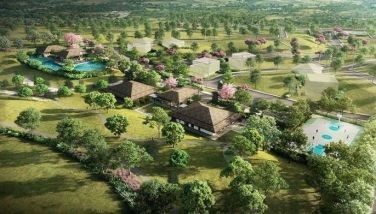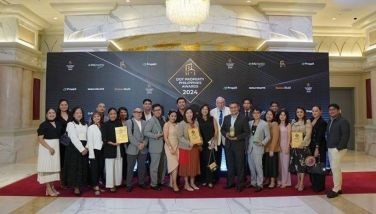DA acts to strengthen R&D system
July 4, 2004 | 12:00am
TAGAYTAY CITY – Agriculture research and development (R&D) administrators and specialists hammered out here recently strategies to strengthen and improve the Department of Agriculture’s (DA) R&D system in line with the realities of the time.
Occasion was the annual planning and review workshop of the DA-Bureau of Agricultural Research (BAR) held at the Development Academy of the Philippines (DAP) in this scenic Cavite City.
BAR is the DA agency mandated "to ensure that agricultural research is coordinated and undertaken for maximum utility to agriculture."
Under the Arroyo administration, the DA headed by Secretary Luis Lorenzo Jr. has pursued reforms that aim to reorient BAR’s national research development, and extension (RDE) policies.
For instances, said Director William C. Medrano, BAR has prioritized strategic and applied research that focuses on market-oriented, innovation-driven, and farmer-oriented studies that seek to increase farm production and income and encourage collaboration with the private sector.
Another item on BAR’s priority list is networking with the private sector and other research organizations, as well as partnership with local government units (LGUs), nongovernment organizations (NGOs), and key stakeholders to disseminate newly generated technologies to poor farmers and fisherfolk.
The meeting reviewed and analyzed DA’s accomplishments in 2003 in relation to the performance targets set for the period and identified the various factors that impeded productivity. It also defined the targets and expected outputs for 2004 and improve them considering the experiences learned from the past.
The significant findings of the external program and management review (EPMR) team was likewise presented and discussed during the workshop.
Headed by noted scientist Dr. Feliciano B. Calora Sr., the EPMR team was created in March last year to review the performance of member-institutions of the National R&D System for Agriculture and Fisheries (NaRDSAF) in the implementation of R&D projects financially assisted by DA-BAR.
To date, the team has reviewed 213 DA-BAR-funded R&D projects of DA Bureaus, attached agencies, and state colleges and universities strewn across the the country.
In a report, EPMR team leader, Dr. Calora averred that under any circumstance, DA-BAR must always produce output that will reflect a high level of competence of the manpower and commensurate to the financial resources made available to the agency.
Dr. Calora, a former UP Los Baños ranking official and later a private industry research administrator, concluded: "The profitability of agriculture to the traders and processors and the eventual increase in revenue to the government are not truly meaningful if the farmers do not get a fair share from the profits derived from agriculture."
Occasion was the annual planning and review workshop of the DA-Bureau of Agricultural Research (BAR) held at the Development Academy of the Philippines (DAP) in this scenic Cavite City.
BAR is the DA agency mandated "to ensure that agricultural research is coordinated and undertaken for maximum utility to agriculture."
Under the Arroyo administration, the DA headed by Secretary Luis Lorenzo Jr. has pursued reforms that aim to reorient BAR’s national research development, and extension (RDE) policies.
For instances, said Director William C. Medrano, BAR has prioritized strategic and applied research that focuses on market-oriented, innovation-driven, and farmer-oriented studies that seek to increase farm production and income and encourage collaboration with the private sector.
Another item on BAR’s priority list is networking with the private sector and other research organizations, as well as partnership with local government units (LGUs), nongovernment organizations (NGOs), and key stakeholders to disseminate newly generated technologies to poor farmers and fisherfolk.
The meeting reviewed and analyzed DA’s accomplishments in 2003 in relation to the performance targets set for the period and identified the various factors that impeded productivity. It also defined the targets and expected outputs for 2004 and improve them considering the experiences learned from the past.
The significant findings of the external program and management review (EPMR) team was likewise presented and discussed during the workshop.
Headed by noted scientist Dr. Feliciano B. Calora Sr., the EPMR team was created in March last year to review the performance of member-institutions of the National R&D System for Agriculture and Fisheries (NaRDSAF) in the implementation of R&D projects financially assisted by DA-BAR.
To date, the team has reviewed 213 DA-BAR-funded R&D projects of DA Bureaus, attached agencies, and state colleges and universities strewn across the the country.
In a report, EPMR team leader, Dr. Calora averred that under any circumstance, DA-BAR must always produce output that will reflect a high level of competence of the manpower and commensurate to the financial resources made available to the agency.
Dr. Calora, a former UP Los Baños ranking official and later a private industry research administrator, concluded: "The profitability of agriculture to the traders and processors and the eventual increase in revenue to the government are not truly meaningful if the farmers do not get a fair share from the profits derived from agriculture."
BrandSpace Articles
<
>
- Latest
Latest
Latest
October 23, 2024 - 9:30am
By May Dedicatoria | October 23, 2024 - 9:30am
October 11, 2024 - 3:45pm
October 11, 2024 - 3:45pm
October 10, 2024 - 11:30am
October 10, 2024 - 11:30am
October 5, 2024 - 12:08pm
October 5, 2024 - 12:08pm
September 24, 2024 - 1:00pm
September 24, 2024 - 1:00pm
September 13, 2024 - 4:00pm
September 13, 2024 - 4:00pm
Recommended






























